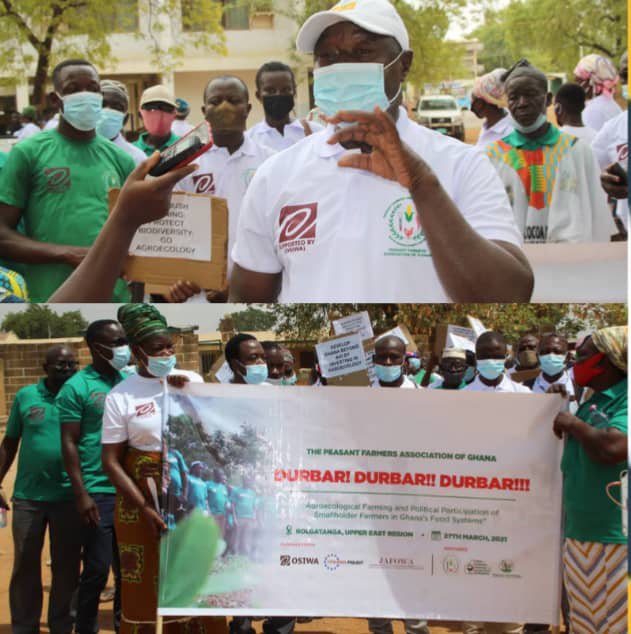
The Peasant Farmers Association of Ghana (PFAG), Centre for Indigenous Knowledge and Organizational Development (CIKOD) and Ghana National Sesame Business Farmers Association have expressed worry about the manner in which government is handling it’s flagship program “one-Village-One-dam. Farmers” . Civil Society Organizations and other stakeholders prior to the 2020 election said the idea of the construction of the dams were laudable but described it’s implementation as poor.
The National Chairman of the Peasant farmers Association Mr Abdul Rahman Mohammed made the assertion when he presented a petition to president Akufo Addo on Saturday 27th March 2021 through the Regional Ministry of Food and Agriculture Director Mr Francis Ennor pleaded with the government to take a second look at the one-village-one-dam project to redeem the purpose for it creation.
Mr Abdul Rahman said “ we are disappointed that there is no budget allocation for the continuation of the one village one dam. We appeal to government to reconsider allocating money for completion of dams under construction as part of the one village one dam and also desilt the silted dams to enable farmers engage themselves in all year round farming.
The Peasant Farmers Association of Ghana in the year 2020 conducted a research into the construction of the one-village-one-dam project and it was revealed that the lack of proper consultation with key stakeholders regarding construction of the dams contributed to the lapses in its implementation.
Other lapses identified included the disregard for dam safety issues, adverse effects on the environment due to the felling of trees to make way for the construction of the dams, loss of farmlands, destruction of wetlands in some cases as well as dam designs not based on topography and specific needs of communities.
The study further observed that the active participation of stakeholders such as hydrologists, geomorphologists, earth scientists, irrigation experts, Irrigation Development Authority (IDA), district assemblies, and members of the beneficiary communities were lacking, hence resulting in some of the dams being poorly executed.
The study, all the same, established that 83 out of the 140 dams promised had been completed with a number of them at various levels of construction. However, the group in the petition appeal to the government to invest in agroecology to help address climate change impact on smallholder farmers in northern Ghana.
Ghanaian relies heavily on agriculture as a key sector of her economy.
Agriculture plays significant role in poverty reduction, food security and employment. vibrant agriculture sector, will help reduce movement of young men and women to southern Ghana to search for non-existing jobs will be reduced.
The current farming practices coupled with mining activities and population growth has led to the destruction the forest landscape of Northern Ghana and has almost made the area a desert, all the tree cover and the vegetation is gone, the rainfall pattern is erratic and inconsistent, high temperatures and emergence of pest and diseases.
Mr Abdul Rahman added that there is a limited investment to combat climate change, ensuring environmental sustainability and improving the incorporation of indigenous knowledge in farming. This has contributed to the deforestation, depletion of our biodiversity and poor agricultural performance in recent times.
“With agroecology, we are able to still produce, maintain our soil cover, plant more trees, rear livestock and poultry leading to increase in incomes for smallholder farmers. With improved economic activities, there will be reduction of the youth travelling to southern Ghana to seek for greener pastures” Mr Rahman noted.
The peasant’s Farmer’s Association of Ghana also appealed to government to subsidize mechanization services and water pumping machines for the youth to continue with dry season gardening and livestock rearing activities’, re-orient public expenditure priorities to recognize important agricultural development priorities such as rural infrastructure and training in agro ecological farming skills.
“In particular we recommend investment in technologies that focus on recognising, preserving and utilising appropriate traditional and indigenous knowledge”.
The group therefore, called on Government to be more aggressive in promoting sustainable agriculture to smallholder farmers. This will require an integrated soil fertility management approach, promote the joint use of organic and inorganic fertilizers in the short run and promote organic fertilizer in the long run.
By:Gaspard Ayuureneeya/mywordfmonline.com